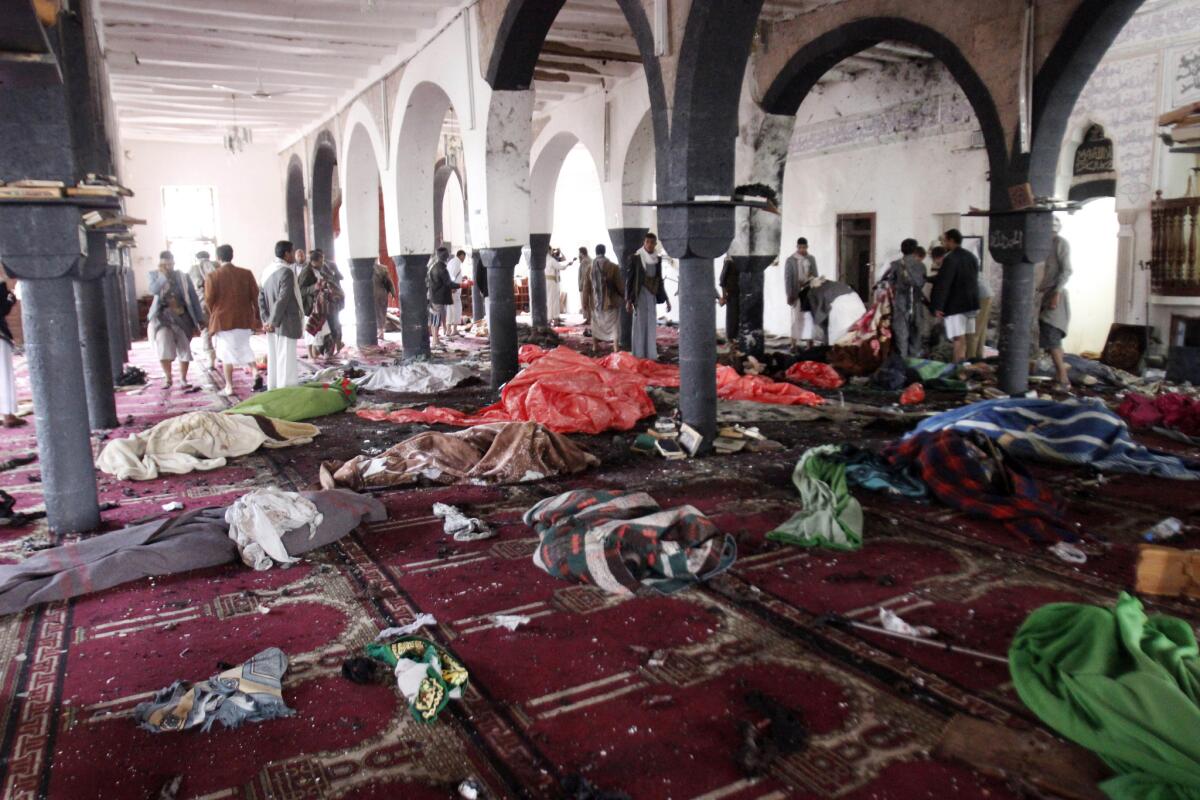Death toll in Yemen mosque bombings rises to 137

- Share via
Reporting from Sana, Yemen — Bombs tore through two crowded mosques here in Yemen’s capital on Friday, and state television reported at least 137 people dead.
The mosques were frequented by members of the Shiite Muslim Zaidi sect, from which the Houthi rebels, who seized control of Sana last year, are mainly drawn.
The blasts, which also injured 360 people, illustrated the increasing chaos in Yemen, which has been an important U.S. ally in the fight against Al Qaeda in the Arabian Peninsula, one of the terrorist network’s most dangerous franchises.
Yemen has become a proxy battleground for regional Sunni and Shiite Muslim powers. The Houthis accuse Sunni Saudi Arabia of propping up President Abdu Rabu Mansour Hadi, who fled Sana early this year, while opponents of the Houthis say the rebels are supported by rival Shiite Iran.
The deadly explosions followed fighting a day earlier in the port city of Aden, in which Houthi-controlled militias have been battling fighters loyal to Hadi.
More fighting took place Friday in Aden, 185 miles south of Sana, as the two sides battled for control of military bases and weaponry, officials and witnesses said.
Islamic State took responsibility for the bombings in Sana in a statement, though there was no way to immediately confirm the claim. Suspicion also fell on Al Qaeda, which has been confronting the Houthis in several parts of the country, separate from the rebels’ clashes with forces supporting the embattled president.
The blasts came during Friday midday prayers, the most-heavily attended prayers of the Muslim week. The first of the attacks was at the Badr mosque in the city center, with one bomber detonating a suicide vest outside, killing guards who had been checking those going inside for weapons.
A second attacker managed to make his way inside the mosque, apparently by faking a broken leg that was covered in a plaster cast and hobbling on crutches, a witness said.
The explosion inside the mosque left dozens of wounded calling for help amid bloodied shoes and clothing. Scores of people were killed, medical officials said.
Hospital authorities put out an appeal for blood donations to help the wounded. Among the dead was one of the Houthis’ most prominent religious scholars, Murtza Zaid Mahtory.
The second attack took place at the Hashoosh mosque in the northern part of the capital, and also left dozens dead and wounded, according to witnesses and officials.
The overall death toll from the two attacks was expected to rise given the number of people who were seriously injured.
The Houthis, who had long demanded a greater share of power in Yemen, surged out of their northern strongholds last year and cemented their grip on the capital within a matter of weeks. In January, they seized the presidential palace and put Hadi under house arrest, but he escaped and made his way to Aden.
Hadi remains recognized by the international community as president, though the Houthis forced him to issue a resignation, which he later recanted.
Most Western governments, including the United States, have shuttered their embassies in Sana. Envoys from neighboring Persian Gulf Arab countries have also been withdrawn.
The fighting is crippling an already weak economy in the Arab world’s poorest country.
Al-Alayaa is a special correspondent. Times staff writer Laura King contributed to this report from Cairo.
Follow @laurakingLAT on Twitter for news out of the Middle East.
More to Read
Sign up for Essential California
The most important California stories and recommendations in your inbox every morning.
You may occasionally receive promotional content from the Los Angeles Times.













